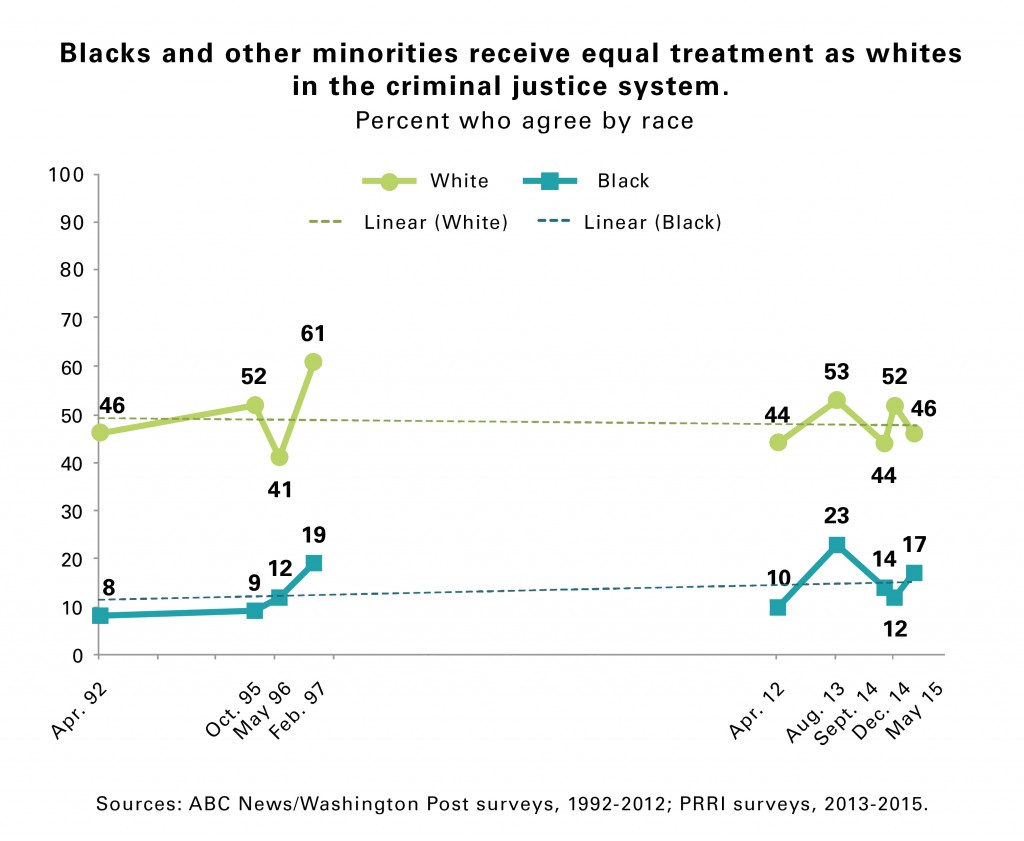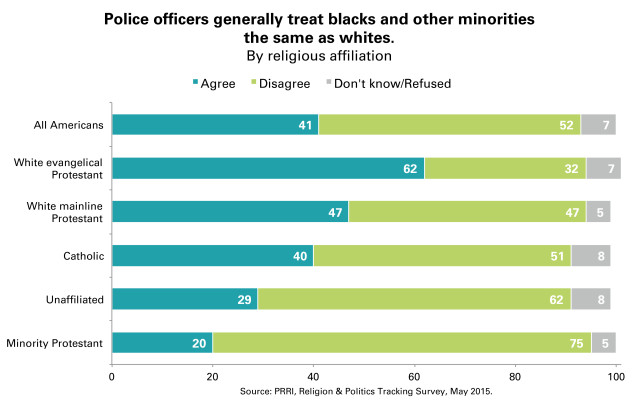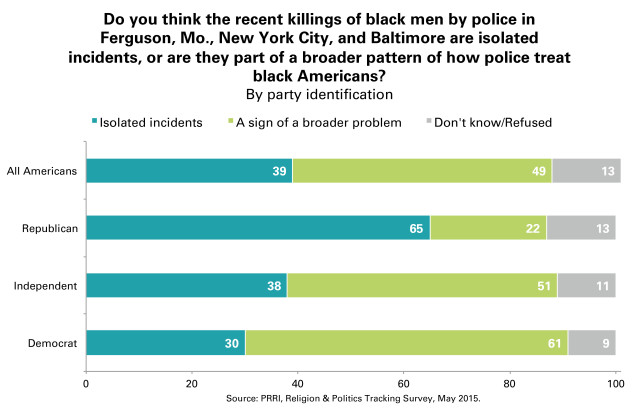I. Awareness of Protests and Riots in Baltimore
Americans’ awareness of recent events in Baltimore is high, with more than two-thirds (68%) saying they have heard a lot about the protest demonstrations and riots in Baltimore. Roughly one-quarter (24%) say they have heard a little, while only six percent report having heard nothing at all.
Familiarity with these events varies considerably by race and ethnicity. Close to nine in ten (87%) black Americans say they have had heard a lot about the protests in Baltimore, compared to 69% of white Americans and 52% of Hispanic Americans.
II. Do Black Americans Receive Fair Treatment by the Criminal Justice System?
Approximately four in ten (41%) Americans overall agree that blacks and other minorities receive equal treatment as whites in the criminal justice system, compared to a slim majority (51%) who disagree.
Perceptions of the fairness of the criminal justice system are heavily influenced by race, with nearly a 30-percentage point gap between black and white Americans. Only 17% of black Americans agree that blacks and other minorities receive equal treatment to whites in the criminal justice system, compared to 78% who disagree. White Americans (46% agree vs. 47% disagree) and Hispanics Americans (39% agree vs. 48% disagree) are more divided on this issue. White evangelical Protestants stand out as the religious group most likely to say the criminal justice system treats racial minorities and whites equally (57% agree, 37% disagree).
Current differences between white and black Americans in views about fairness of the criminal justice system reflect long-standing racial divisions. In 1992, the same year of the Rodney King riots in Los Angeles, white Americans were almost evenly divided over whether blacks and whites receive equal treatment in the criminal justice (46% agreed vs. 43% disagreed). That same year, fewer than one in ten (8%) black Americans said that blacks are treated the same as whites in the criminal justice system, while 89% disagreed.
Partisan differences on racial equality within the criminal justice system rival racial and ethnic differences. Roughly two-thirds (66%) of Republicans say that blacks and whites are treated equally in the criminal justice system, while majorities of Democrats (66%) and independents (53%) disagree.
III. Treatment of Black Americans by Police
Response patterns are similar on the question of police treatment of racial minorities. Roughly four in ten (41%) Americans say that police officers generally treat blacks and other minorities the same as whites, compared to a majority (52%) who disagree. Attitudes have remained relatively stable since late last year. In November 2014, Americans were divided over whether police officers generally treat blacks the same as whites or not—45% agree vs. 52% disagree.
Views about treatment of black Americans by police are polarized by race and ethnicity. Eighty-four percent of black Americans and 60% of Hispanic Americans do not believe that police officers treat blacks and other minorities the same as whites. By contrast, 47% of white Americans say police officers treat ethnic minorities fairly, while a similar number (45%) disagree.
Attitudes about police treatment of blacks are also strongly influenced by partisan attachments. About two-thirds (63%) of Republicans say that police officers generally treat blacks and other minorities the same as whites, while more than two-thirds (68%) of Democrats disagree. Political independents are more divided; 41% agree that police treat ethnic minorities and whites equally, while 49% disagree.
Americans of different religious backgrounds express substantially different views about police officers’ treatment of black Americans. More than six in ten (62%) white evangelical Protestants say that police officers treat blacks the same as whites, while fewer than half of white mainline Protestants (47%) and white Catholics (47%) agree. In contrast, 62% of religiously unaffiliated Americans and 75% of minority Protestants do not say police treat white and non-white Americans equally.
IV. Isolated Incidents or a Broader Pattern of Behavior?
Nearly half (49%) of Americans believe the recent killing of black men by police in Ferguson, Mo., New York City, and Baltimore are part of a broader pattern of how police treat black Americans, compared to 39% who believe they are isolated incidents; notably, 13% offer no opinion.
A survey conducted late 2014 found that a slim majority (51%) of Americans believed that the recent police killings of black men in Ferguson, Mo. and New York City were isolated incidents, while 43% believed they were a sign of broader problems (Source: ABC News/Washington Post Poll, December 2014).
Much of the modest shift in opinion is driven by changes among white Americans. In late 2014, 60% of white Americans said that the recent killings of black men by police were isolated incidents, but fewer than half (45%) express this view today. Thirty-five percent of white Americans in late 2014 said that these killings were part of a broader pattern of behavior among police; 43% say the same today. Views among black Americans are identical in both time periods. Nearly three-quarters of black Americans today (74%) and late last year (74%) say that recent killings of black men represent a pattern of behavior by police.
Partisan differences in views are also significant. Nearly two-thirds (65%) of Republicans believe recent killings of black men by police are isolated incidents. In contrast, more than six in ten (61%) Democrats—including 58% of white Democrats—believe they represent a broader pattern. Political independents are more likely to say that police killings are part of a pattern of behavior than that they are isolated incidents—51% vs. 38%, respectively.
Among religious groups, white evangelical Protestants are the only major religious group in which a majority says the recent police killings of black men are isolated incidents. Close to six in ten (57%) white evangelical Protestants say that recent killings of black men are isolated incidents, a view shared by significantly fewer white mainline Protestants (47%) and white Catholics (50%). More than six in ten religiously unaffiliated Americans (61%) and minority Protestants (70%) say that such killings by police are part of a broader pattern.
Recommended citation:
Jones, Robert P., and Daniel Cox. “Deep Divide between Black and White Americans in Views of Criminal Justice System.” PRRI. 2015. http://www.prri.org/research/divide-white-black-americans-criminal-justice-system/.





